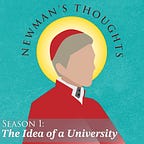Reading for Day 15: The Idea of a University, Discourse II, Theology a Branch of Knowledge § 2
Complete Recording of Discourse II @ Catholic Culture Audiobooks
Paperback with Introduction by Dr. Don Briel available @ Cluny Media
Full online text of The Idea of a University and other works by St. John Henry Newman are available @ the National Institute for Newman Studies’ Newman Reader
I think this will be found to be no matter of words. I allow then fully, that, when men combine together for any common object, they are obliged, as a matter of course, in order to secure the advantages accruing from united action, to sacrifice many of their private opinions and wishes, and to drop the minor differences, as they are commonly called, which exist between man and man. No two persons perhaps are to be found, however intimate, however congenial in tastes and judgments, however eager to have one heart and one soul, but must deny themselves, for the sake of each other, much which they like or desire, if they are to live together happily. Compromise, in a large sense of the word, is the first principle of combination; and any one who insists on enjoying his rights to the full, and his opinions without toleration for his neighbour's, and his own way in all things, will soon have all things altogether to himself, and no one to share them with him. But most true as this confessedly is, still there is an obvious limit, on the other hand, to these compromises, however necessary they be; and this is found in the proviso, that the differences surrendered should be but "minor," or that there should be no sacrifice of the main object of the combination, in the concessions which are mutually made. Any sacrifice which compromises that object is destructive of the principle of the combination, and no one who would be consistent can be a party to it.
Thus, for instance, if men of various religious denominations join together for the dissemination of what are called "evangelical" tracts, it is under the belief, that, the object of their uniting, as recognized on all hands, being the spiritual benefit of their neighbours, no religious exhortations, whatever be their character, can essentially interfere with that benefit, which faithfully insist upon the Lutheran doctrine of Justification. If, again, they agree together in printing and circulating the Protestant Bible, it is because they, one and all, hold to the principle, that, however serious be their differences of religious sentiment, such differences fade away before the one great principle, which that circulation symbolizes—that the Bible, the whole Bible, and nothing but the Bible, is the religion of Protestants. On the contrary, if the committee of some such association inserted tracts into the copies of the said Bible which they sold, and tracts in recommendation of the Athanasian Creed or the merit of good works, I conceive any subscribing member would have a just right to complain of a proceeding, which compromised the principle of Private Judgment as the one true interpreter of Scripture. These instances are sufficient to illustrate my general position, that coalitions and comprehensions for an object, have their life in the prosecution of that object, and cease to have any meaning as soon as that object is compromised or disparaged.
When, then, a number of persons come forward, not as politicians, not as diplomatists, lawyers, traders, or speculators, but with the one object of advancing Universal Knowledge, much we may allow them to sacrifice,—ambition, reputation, leisure, comfort, party-interests, gold; one thing they may not sacrifice,—Knowledge itself. Knowledge being their object, they need not of course insist on their own private views about ancient or modern history, or national prosperity, or the balance of power; they need not of course shrink from the cooperation of those who hold the opposite views; but stipulate they must that Knowledge itself is not compromised;—and as to those views, of whatever kind, which they do allow to be dropped, it is plain they consider such to be opinions, and nothing more, however dear, however important to themselves personally; opinions ingenious, admirable, pleasurable, beneficial, expedient, but not worthy the name of Knowledge or Science. Thus no one would insist on the Malthusian teaching being a sine quâ non in a seat of learning, who did not think it simply ignorance not to be a Malthusian; and no one would consent to drop the Newtonian theory, who thought it to have been proved true, in the same sense as the existence of the sun and moon is true. If, then, in an Institution which professes all knowledge, nothing is professed, nothing is taught about the Supreme Being, it is fair to infer that every individual in the number of those who advocate that Institution, supposing him consistent, distinctly holds that nothing is known for certain about the Supreme Being; nothing such, as to have any claim to be regarded as a material addition to the stock of general knowledge existing in the world. If on the other hand it turns out that something considerable is known about the Supreme Being, whether from Reason or Revelation, then the Institution in question professes every science, and yet leaves out the foremost of them. In a word, strong as may appear the assertion, I do not see how I can avoid making it, and bear with me, Gentlemen, while I do so, viz., such an Institution cannot be what it professes, if there be a God. I do not wish to declaim; but, by the very force of the terms, it is very plain, that a Divine Being and a University so circumstanced cannot co-exist.




